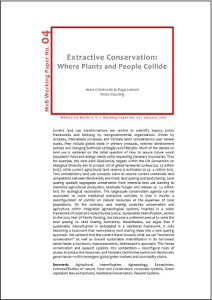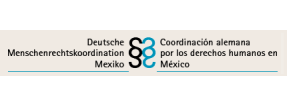 Extractive Conservation: Where Plants and People Collide
Extractive Conservation: Where Plants and People Collide
Anne Cristina de la Vega-Leinert y Peter Clausing
México vía Berlín e. V.
Serie: MvB Documentos de Trabajo Nr. 4.
Enero, 2016.
Summary
Current land use transformations are central to scientific inquiry, policy frameworks and lobbying by non-governmental organizations. Driven by complex, interrelated processes and intricate actor constellations over nested scales, they include global trade in primary products, national development policies and changing livelihood strategies and lifestyles. Much of the debate on land use is centered on the initial question of how to secure future world population food and energy needs while respecting planetary boundaries. Thus for example, the 2010 Aichi Biodiversity targets within the UN Convention on biological Diversity aim to protect 17% of global terrestrial surface (ca. 23 million km2), while current agricultural land reserve is estimated at ca. 4 million km2. Two contradictory land use concepts claim to resolve current worldwide land competition between Biodiversity and Food: land sparing and land sharing. Land sparing spatially segregates conservation from intensive land use claiming to maximize agricultural production, eradicate hunger and release ca. 1.5 million km2 for ecological restoration. This large-scale conservation agenda can be associated to more traditional extractive activities in that it implies a reconfiguration of control on natural resources at the expenses of local populations. On the contrary, land sharing combines conservation and agriculture within integrated agroecological systems, inserted in a wider framework of social and redistributive justice. Sustainable intensification, central to the 2014 Year of Family Farming, has become a preferred avenue to solve the land sparing vs. land sharing dichotomy. Nevertheless, we argue that if sustainable intensification is embedded in a neoliberal framework, it risks becoming a buzzword that mainstreams land sharing ideas into a land sparing approach. We contend that the current trend towards what we call “extractive conservation” as well as toward sustainable intensification in its narrowest sense foster a top-down, macro-economic, technocentric approach. This forces conservation and peasant systems into competition— reconfigure rules of access to productive resources, and hampers distributive justice and democratic governance—within emergent global green markets and commodity chains.

